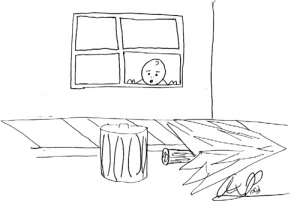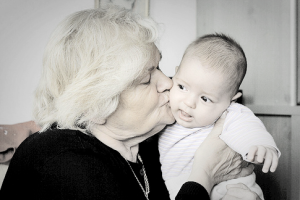The holidays affect our lives in many different ways. Our schedules change with our children on winter vacation and we are in more contact with relatives and friends than the rest of the year. The season becomes its own new routine with the home decorated, siblings and parents around much more and parties, or events, that involve traveling or filling the house with friends and family. When the holidays are finally over, as adults, we might feel exhausted, relieved, or as if we just stepped off of a roller-coaster. We can expect that children will experience similar emotions once the holidays have come and gone. As important as it is to manage the transition into the holiday season for an infant, it is important to ease them back into normal life once the holidays have passed.
Many families culminate the holidays with a decoration exorcism by putting away and throwing out everything holiday related almost immediately. As adults, this might seem practical and a little bit therapeutic, but the sudden change can be a heavy load for an infant to carry. From their perspective, the world has literally been turned upside down.
Take a little bit of time throughout the holidays to communicate to your child with short and clear messages. Explaining that this is a season and as such it will come and go. This is a perfect way to begin to ease the transition back to normal life. Let them know that relatives will return to their home, brothers and sisters will return to school and the decorations will have to come down.
With an infant in the house, it is especially important to slow the process down. In the case of decorations, consider the act of taking them down and putting them away less as, “cleaning up,” and more as a family experience. This process will help your child better understand what the holiday is all about. This does not mean you need to completely alter your schedule. It is simply giving a little bit of extra time for your child to process and get a little bit of closure. This way, it will not appear as if the “magic” of the holidays just disappeared.
In the case of toddlers, try giving them their own special box and allowing them to have a few extra days to put their favorite holiday memories away. They will not fee rushed. They will be given a moment to realize the festive time is coming to an end.
Leaving holiday books on the shelves is another way to make the transition smoother. This is helpful because this allows your child to keep the holidays present with them in all seasons, reminding them that it is something that happens every year. Even though we as adults may not feel the same way, there some holiday books that children like to read year round. The books add to the memories of the wonderful time they just experienced. Leaving some holiday books out will give the child a sense of continuity.
By patiently planning a transition out of the holidays for our children, as well as ourselves, we are modeling the significance of these celebrations. This simple process allow us as adults the opportunity to take a breath and absorb how beautiful and amazing the holidays are with young children because, after all, they grow up so fast.
Post by: Magdalena Palencia
Post by: Magdalena Palencia


